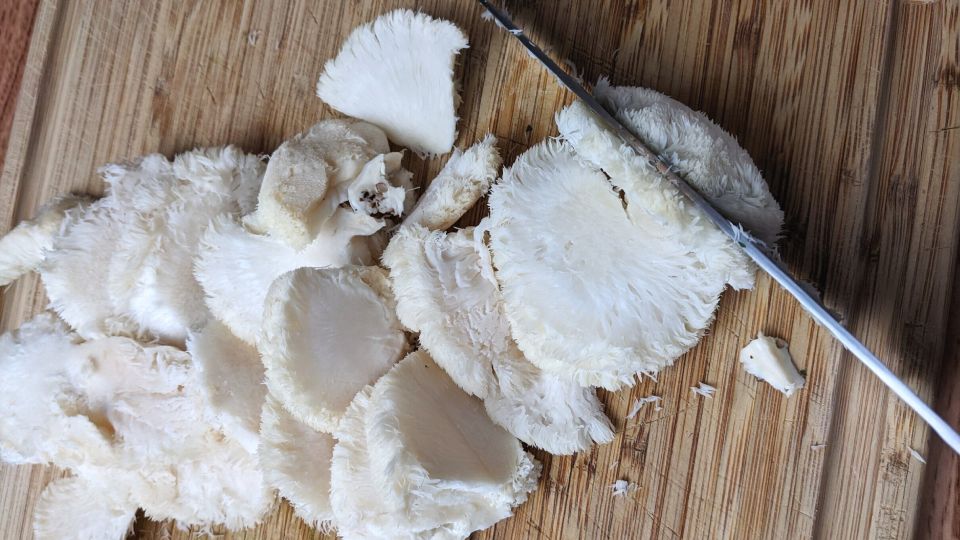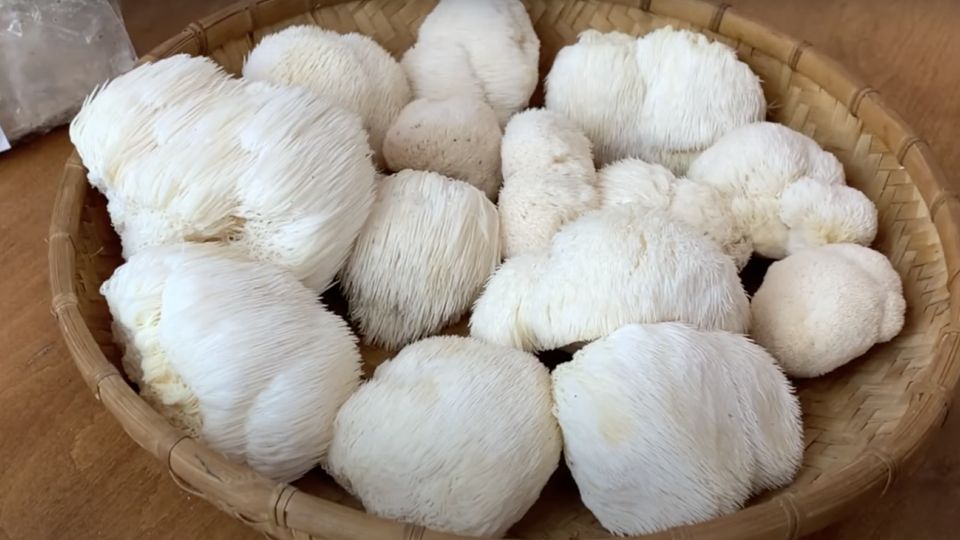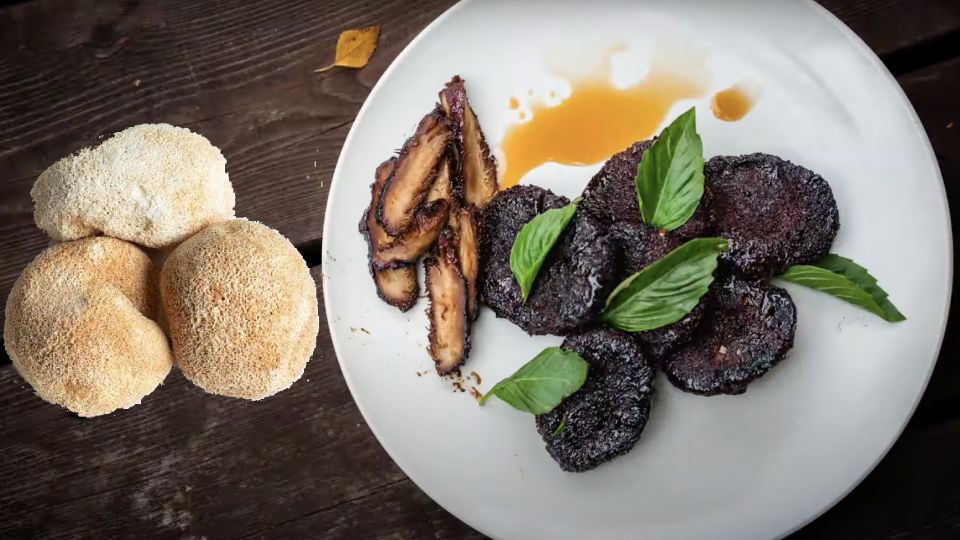Lion’s Mane Taste: Does It Taste Like Mushrooms?
The Lion’s Mane mushroom, known by its scientific name Hericium erinaceus, is a unique fungus found in North America, Europe, and Asia, is an edible mushroom belonging to the tooth fungus group. Often referred to as the ” mountain-priest mushroom, bearded tooth fungus, and bearded hedgehog” due to its long, cascading spines, this mushroom has gained popularity not only for its impressive health benefits but also for its intriguing taste. Understanding the taste of Lion’s Mane is crucial for those who wish to explore the culinary possibilities this mushroom offers.
In this article:
What Does Fresh Cooked Lion’s Mane Mushroom Taste Like?
Lion’s mane mushroom is truly unique and packed with nutrition. It offers a mild, delicate flavor often likened to seafood, with a subtle hint of sweetness.
The taste is reminiscent of lobster or crab, and when cooked, it becomes tender and juicy, much like fresh seafood. It’s a fantastic meat substitute in seafood recipes. Keep in mind that the taste can vary based on factors like how they’re grown, the time of year they’re harvested, and your cooking method.
When you cook lion’s mane mushrooms, they can develop a more intense flavor and a crispy, caramelized exterior. Plus, you can tweak their taste with seasonings. For instance, adding a teaspoon of garlic powder to a lion’s mane mushroom recipe will give it a different dimension from the raw mushroom.
According to Alan Bergo, a forager and chef based in Minnesota, the taste of Lion’s Mane Mushroom is mild, and the texture is pretty close to crab
What Does Raw Lion’s Mane Taste Like?

Eating fresh lion’s mane raw is safe but not very enjoyable. Its spongy, chewy texture and somewhat bland taste make it less appealing without seasoning.
Raw mushrooms, including lion’s mane, contain chitin in their cell walls, which can lead to digestive discomfort or even allergies in high concentrations. So, it’s advisable to cook lion’s mane mushrooms before eating them.
If you’re not a fan of the seafood-like taste, you can still reap the benefits of lion’s mane by using supplements or fortified foods that effectively mask the mushroom’s flavor.
Lion’s mane supplements come in various forms like tinctures, powders, and gummies. Additionally, some granola products feature highly concentrated lion’s mane mushroom extract without the distinct mushroom taste.
What Does Lion’s Mane Extract Powder Taste Like?
Lion’s mane extract powder is a concentrated form of the lion’s mane mushroom commonly used as a supplement.
It has an earthy and slightly chocolatey flavor. While not everyone may appreciate the taste, it can be easily added to hot beverages like tea, coffee, or smoothies, as well as soups, stews, or gravies.
Furthermore, there are various forms of Lion’s Mane products, including tinctures, powders, gummies, and more, offering multiple options for those seeking the benefits of this functional mushroom. We’ll discuss consumption methods in detail later in this article.
Lion’s Mane Health Benefits

Lion’s Mane mushrooms are not just a delight for the taste buds; they also offer a plethora of health benefits. The functional components in Lion’s Mane play a crucial role in supporting various aspects of well-being, including mental health, mood, memory, and cognitive function[1]. Some of the notable health benefits include:
- Enhances cognitive function and memory
- Nerve damage repair
- Supports heart health
- Guards Against Dementia
- Mood Support
- Eases Anxiety and Depression
- Regulates blood sugar and lowers blood pressure
- Boosts energy and reduces fatigue
- Prevents excessive blood lipid accumulation
- Delivers anti-aging effects
- Improves gut health
Lion’s Mane Medical Compounds and Its Benefits
| Compound Name | Potential Health Benefits |
| Erinacines | Promotes nerve growth and regeneration |
| Hericenones | Enhances cognitive function |
| Beta-Glucans | Boosts immune system |
| Polysaccharides | Anti-inflammatory properties |
| Antioxidants | Protects cells from oxidative stress |
| Hericerin | May support gastrointestinal health |
| Beta-D-Glucans | Supports cardiovascular health |
| Amino Acids | Building blocks for various bodily functions |
| Minerals (e.g., zinc) | Essential for overall health |
| Vitamins (e.g., B12) | Contributes to metabolic processes |
Lion’s Mane Precautions and Side Effects
While Lion’s Mane offers a myriad of health benefits, it’s essential to be aware of potential side effects. Although rare, some individuals may experience mild gastrointestinal discomfort when consuming Lion’s Mane. Therefore, moderation is key. If you are pregnant, nursing, or have any underlying health conditions, it’s advisable to consult with a healthcare professional before incorporating Lion’s Mane into your diet.
How to Grow Lion’s Mane
If you’re intrigued by Lion’s Mane and want to cultivate it at home, you’re in for a rewarding journey. Growing Lion’s Mane at home is a relatively straightforward process that requires minimal equipment.
You have three main options for home cultivation:
- Using a grow kit: If you’re new to mushroom cultivation, consider a lion’s mane mushroom grow kit. These kits provide an inoculated and incubated substrate ready for fruiting. It’s the easiest option, especially for beginners.
- Growing in bags: In this method, you inoculate your substrate with lion’s mane grain spawn and place it in a bag. Leave it in a dark, warm area for about 2-3 weeks until the substrate fully colonizes. Then, move the bag to a fruiting environment with the right humidity, light, and temperature. You can harvest mushrooms in approximately 6-8 weeks after inoculation.
- Growing on logs: This approach involves using lion’s mane mushroom plug spawn and drilling holes in hardwood logs. Insert the spawn into the holes, seal with wax, and let the logs incubate for several months until fully colonized. Transfer the logs to a fruiting environment with suitable conditions and harvest the mushrooms when they mature.“
Remember, mushrooms can be finicky, so don’t be discouraged if you don’t succeed at first. You can also find organic mushrooms at farmers’ markets or grocery stores. Alternatively, you might try your hand at foraging for wild mushrooms.
How to Cook Lion’s Mane Mushroom

Cooking Lion’s Mane mushrooms is simple, and you can prepare them in various ways, similar to common mushrooms.
Tips
- Store these mushrooms in a paper bag in your fridge to allow them to breathe and have proper airflow.
- Give them a quick rinse to remove dirt, but avoid soaking, as it can make them soggy.
- Slice off the bottom, which may be dirty, and then cut the mushrooms into slices.
Three Best Cooking Ways for Lion’s Mane Mushrooms
- Sauté: Heat a skillet and add butter or ghee. Toss the mushrooms in the butter, cook until golden brown, and enhance the flavor with tamari and garlic.
- Roast: Cut the mushrooms into slices, toss them with olive oil, salt, and pepper, and roast in a 425°F oven for 15-20 minutes until they’re lightly browned and tender.
- Grilled: Brush the mushrooms with olive oil and grill them over medium-high heat for 3-4 minutes on each side until they’re crispy and brown.
Lion’s Mane mushrooms can be a delightful side dish, a topping for crusty bread, or a flavorful addition to dishes like risotto, polenta, and pasta. They have a robust taste and texture, making them suitable as the main attraction. Give these cooking methods a try to savor the unique and delicious flavor of Lion’s Mane mushrooms. For more recipes and cooking ideas, visit our Lion’s mane mushroom recipe blog.
Other Ways to Consume Lion’s Mane Mushroom
Powder – Add the mushroom powder to water, smoothies, or coffee. Just scoop the powder into your drink and stir until it dissolves. You can also mix it into oatmeal, and yogurt, or sprinkle it over salads, soups, and savory dishes.
Tea – Enjoy Lion’s mane tea by steeping dried mushrooms in hot water for several minutes. Sweeten with honey or your preferred sweetener.
Supplements – Consider the mushroom extracts in supplement form for their health-supporting benefits. Reliable extraction methods ensure you can conveniently access these desired health advantages.
Tinctures – Mushroom tinctures are made by steeping the mushrooms in alcohol or glycerin for several weeks. You can add the resulting liquid to your drinks or take it directly.
Capsules – Lion’s Mane capsules offer a convenient way to consume this ingredient. They contain Lion’s Mane mushroom powder or extract and can be taken with water or other beverages.
Gummies – Lion’s Mane gummies provide another convenient option to incorporate this ingredient into your diet. These gummies often contain Lion’s Mane mushroom extract and can be consumed like a tasty treat.
You can find Lion’s Mane supplements combined with other functional mushrooms like Reishi, cordyceps, and chaga. This makes them a convenient option for individuals looking for a holistic approach to their well-being.
FAQs
Can I eat lion’s mane raw?
Yes, you can eat lion’s mane raw. Eating fresh lion’s mane raw is safe but not very enjoyable. Its spongy, chewy texture and somewhat bland taste make it less appealing without seasoning. Raw mushrooms contain chitin in their cell walls, which can lead to digestive discomfort or even allergies in high concentrations. So, it’s advisable to cook lion’s mane mushrooms before eating them.
Does lion’s mane taste bitter?
No, fresh lion’s mane mushrooms have a mild, slightly sweet taste that many people enjoy, often likened to seafood or crab. Cooking enhances their earthy flavor. However, powdered lion’s mane can have a bitter taste.
Does Lion’s mane powder taste good?
Lion’s mane powder’s taste varies among individuals. Some find it mildly sweet and pleasant, while others may perceive a slight bitterness. It’s often used in recipes to enhance flavors. The taste is influenced by personal preferences and the specific product. Experimenting with different recipes can help you find an enjoyable way to consume them.
Lion’s mane powder benefits
Lion’s mane powder offers various benefits. It’s known for potentially enhancing cognitive functions, like memory and focus. Some people believe it could support nerve health and aid digestion. Additionally, it may have immune-boosting properties.
Conclusion- Does Lion’s Mane Taste Like Mushrooms?
In conclusion, Lion’s Mane mushrooms have a distinctive flavor that sets them apart from typical mushrooms. They offer a mild, sweet, and slightly nutty taste, coupled with a firm and meaty texture. Their unique flavor is often likened to seafood, especially crab or lobster meat, boasting subtle sweetness and earthy undertones. However, it’s important to note that their taste can turn bitter if they aren’t cooked until the outer layer becomes crispy. The versatility of Lion’s Mane mushrooms allows you to enjoy them in various forms, whether raw, cooked, or dried. Beyond their intriguing taste and texture, these mushrooms are a nutritional powerhouse, offering a wide array of health benefits.
References
1. Hericium erinaceus (Bull.) Pers. Ethanolic Extract with Antioxidant Properties on Scopolamine-Induced Memory Deficits in a Zebrafish Model of Cognitive Impairment. Retrieved from https://www.ncbi.nlm.nih.gov/pmc/articles/PMC8231562/

